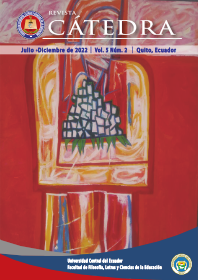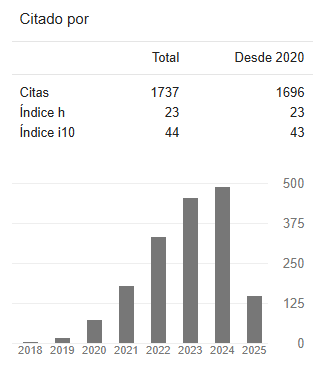School education for social and economic development in Equatorial Guinea
DOI:
https://doi.org/10.29166/catedra.v5i2.3394Keywords:
culture, education, school-man, socio-economic development, societyAbstract
Education helps man to approach his culture, to understand himself, that is to say, what he is; to be aware of what he has and what he can; it makes him capable of understanding, dominating and transforming his socio-cultural environment to live better, so that a school education adapted to the social needs of a country can contribute to the social and economic development of the country. The objective of this research was a study on the adaptation of school education in Equatorial Guinea, to contribute to the formulation of a new educational reality, adapted to the economic and social needs, which favors the social and economic development of the country, to relate the school to the local culture and to the social environment of the Equatoguineans. Methodologically, the study was framed under a qualitative, non-experimental, descriptive approach; the interview was used as a method of data collection, supported by a documentary design. Among the most relevant results, it was obtained as a general claim, the urgent need for the introduction of Equatoguinean values and socio-cultural elements in school education. And as the most significant conclusion, it can be affirmed that there is no social or economic development if school education is not adapted to the socio-cultural reality of the people, if it does not offer them the adequate tools to be able to face the different challenges of their vital environment.
Downloads
References
Agejas, J.A. (2013). La Ruta del encuentro: una propuesta de formación integral en la univerdad. Madrid. Universidad Francisco de Vitoria.
Aretio, L.G (1989). La Educación . Teorías y Conceptos. Perspectiva integradora. Madrid. Paraninfo.
Burbano-Larrea, P. y otros. (2021). Estilos de enseñanza: un estudio descriptivo desde la práctica docente. Revista Cátedra, 4(1), 1.
Comoe-Krou, B. (1982). L’éducation de l’enfant en milieu villageois. In Annales de L’Université. Série F (Tome X, Abidjan 1982, pp. 29-37)
Crespo – Balderrama, M. y Tapia-Figueroa, D. (2021). Innovación de contextos relaciones comunicacionales para una educación transformadora. Revista Cátedra, 4(1), 40-41
Chiang, M. T. (2013). Estilos de enseñanza: un paso adelante en su conceptualización y diagnóstico. Revista de Estilos de Aprendizaje, 6 (11), 63.
Donneux, J-L. (1990). Langues nationales et développement. Le courrier. Afrique Caraibe Pacifique/Communauté européenne (nº 119, janvier Fevrier, 1990, p. 46).
Edjó, F. (2019). 50 años después…Fundamentos del sistema educativo de Guinea Ecuatorial. Madrid: Edición personal.
Erny, P. (1987). L’Enfant et son milieu en Afrique noire. Essaie sur l’éducation traditionnelle. Paris: l’Harmattan
Esono, C. (2004). La necesidad y la importancia de la educación cristiana en Guinea
Ecuatorial. Trabajo fin de Máster. Barcelona: Universitat Abad Oliba CEU.
Esono, C. (2019). Educación: Desarrollo Socio-Económico-Religioso en la sociedad Fang. Memoria de Licenciatura. Universidad Pontificia de Salamanca. Facultad de teología “San Pío X”: Madrid.
Fortoul, M. (2008). La concepción de la enseñanza según los estudiantes del último año de la licenciatura en Educación Primaria en México, Horizantes, 30 (119), 72-89
Foulquié, P. (1991). Dictionnaire de la Langue Pédagogique. Paris: Quadrige/ P.U.F
Granados, J – Granados, J.A. (2010). La alianza educativa. Introducción al arte de vivir. Burgos. Monte Carmelo
Lena, M. (1981). L’Esprit de l’éducation. Paris: Fayard.
Lobrot, M. (2016). Priorité à l’éducation. Petite bibliotèque. Paris. Payot.
Mariti Castro, I. (2003). Diccionario Enciclopédico. Madrid: Ceac
Mialaret, G. (1990). Introduction à la pédagogie. Paris: P.U.F
Pisani, E. (1988). Pour l’Afrique. Paris: Odile Jacob.
Rafenoarisoa, O (1979). Un développement africain. Pirogue. (nº 76, octobre-décembre 1979, pp. 3-4)
Renés, P. y Martínez, P. (2016). Una mirada a los estilos de enseñanza en función de los estilos de aprendizaje. Journal of LearningStyles, 9 (18), 224-243
Sikounmo, H. (1992). L’école de sous-développement. Gros paln sur l’enseignement secondaire en Afrique. Paris: l’Harmattan.
Tébar Belmonte. L. (2003). El perfil de un profesor Mediador. Madrid. Santillana.
Tedga, P. J.M. (1994). L’enseignement supérieur en Afrique noire francophone: La catastrophe? Paris: l’harmattan
Zinzindohoue, P. (1989). Système s éducatifs et développement intégré en Afrique noire. Une aproche culturelle. Cas du Bénin et du Côte d’Ivoire. Mémoire de DEA: Université nationale de Côte d’Ivoire.









